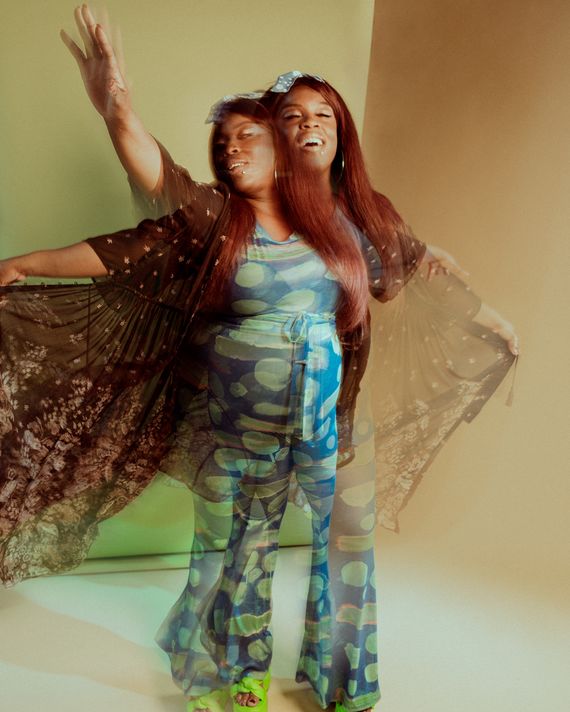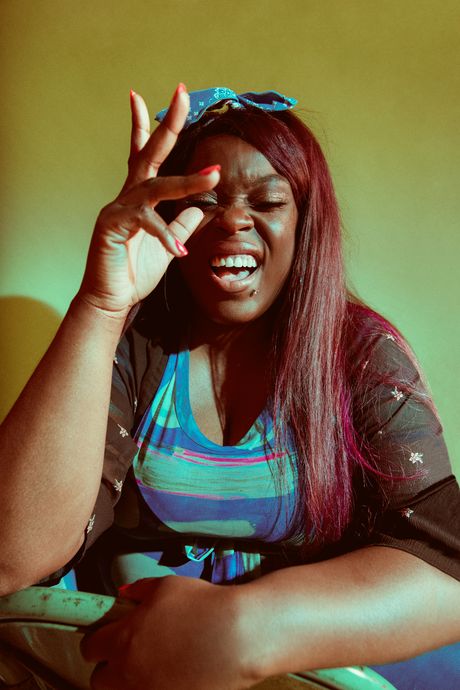
Yola knows what some music heads will wonder after they watch her in Elvis, the latest cinematic spectacular from Baz Luhrmann: why Sister Rosetta Tharpe, the woman who invented rock and roll and became one of Elvis Presley’s primary Black influences, doesn’t get much more than a minutes-long performance of the spiritual “Strange Things Happening Every Day.” “Let’s just take one thread we can ostensibly trace,” Yola begins. It is late on a Sunday at Urban Cowboy, a hotel and bar in the heart of gentrifying East Nashville, and she will give anyone who will listen a lesson on who came before the King: “She clocked Little Richard out of a backwater in Georgia and gave him his rise to fame. If we don’t have that drag-wearing Black man being as free as he feels he can be, enough to inspire Prince” — her eyes widen as she imagines the alternate timeline — “then what happens if we don’t have Prince? We wouldn’t know what kind of postapocalyptic music nightmare we’d be in if we don’t hold things up to the light.”
But she isn’t losing sleep over the film’s slight depiction. Many Black artists might have balked at taking on the minor role given to a major artist in a biopic that once again centers one of the most famously overexposed white men in music history. For Yola, there was simply no passing up the opportunity to play a woman so integral to the development of her own sound. Born Yolanda Claire Quartey, Yola, 38, launched her career in England with a 2016 EP spanning rock, dance, and country-adjacent folk. Soon after, she took on Nashville, showcasing at conferences like AmericanaFest, where she caught the attention of producer and Black Keys front man Dan Auerbach, who signed Yola to his Easy Eye Sound label. Her debut album, 2019’s Walk Through Fire, was a commercial and critical success, landing her on editorial playlists and the radar of film producers.
Singing in Elvis, of course, came easily to Yola, who regularly belted Tharpe’s gospel classic “Didn’t It Rain” in the shower growing up. She could perform off muscle memory and intuition, an asset Luhrmann saw when he hired her to cover a song for the soundtrack. The producers also knew she could match Tharpe’s vocals but couldn’t know for sure how Yola, who had never acted before, would do onscreen. Then came a recording session with Luhrmann on Music Row in 2019. “You could see his nose getting ever closer to the glass, peeking in and then giving directions and then just watching,” she says, laughing. “Then he started taking photos of different angles of me to see if my bone structure was a bit similar. So I’m getting screen-tested already in the studio.”
Yola is no Rosetta doppelgänger, but what she lacked in resemblance she made up for in astute presence, reviving Tharpe’s compelling onstage charisma; the tilt of the head, eyes to the heavens, as her voice soars: it’s all there. Still, to fully channel Tharpe — who first picked up the guitar at age 4 — is to wrap steady fingers around the neck of a Les Paul, to bend strings and distort sound … to play. “I wanted to go through exactly what it was, physically, to do what she was doing,” says Yola, who had just over a year to build on her own chord-focused approach and master Tharpe’s soloing technique. She “wanted to know how hard it was.” The guitar was essential to Tharpe’s spiritual expression. She performed first with her mother and later as a solo act, moving from gospel concerts and tent revivals to nightclubs, perfecting her versatile, electric-guitar-driven style at each stop. Now, generations removed from a time when the guitar was the most convenient instrument to create music of many genres, Black folk in the mainstream with six-strings strapped to their backs are the exception, not the rule. “And you don’t know that you’re missing it,” Yola says. “You don’t know that you have an owner-ship over a legacy that’s yours to have. And then you’re like, Wait a minute — now that I think about it, that might be more our shit than anyone else’s shit.”
In Luhrmann’s film, the cradle-to-grave arc of Elvis’s life is filtered through the lens of Colonel Tom Parker, his eccentric Dutch manager (played convincingly by Tom Hanks), who, in the years following Elvis’s death, was found to have mismanaged the artist’s vast fortune. Yet it is impossible to consider Elvis’s success without the savvy influence of Parker, the former carnival worker who knew just how to turn the awkward kid from Tupelo, Mississippi, into a main-stage attraction. The film’s focus is not on Elvis the man but Elvis the moneymaking machine, and in the context of the business, Elvis’s exposure to (and imitation of) rock’s Black originators feels like a means to a necessary, highly lucrative end. The cultural theft isn’t vocalized in the film. It doesn’t have to be. The on-the-nose Beale Street scenes get the job done: There, a regal Tharpe reigns over a nightly showcase, introducing the world to prodigies (like Richard) and future stars; Big Mama Thornton belts out her original, stirring rendition of “Hound Dog”; B.B. King serves as Elvis’s ear and Official Black Friend.
There is the sense that Hollywood knew better than to release an Elvis movie in 2022 without the Black folks who established him—but also that it was unsure how to incorporate said Black folks without making Elvis look like the “greatest minstrel America ever spawned,” as renowned Black critic Margo Jefferson dubbed him in 1973. Yes, Elvis spent his childhood in a Black neighborhood in Mississippi, and, yes, he came of age in Memphis just as Black blues, gospel, and soul were coalescing into this hot new sound called “rock and roll.” But the split screen juxtaposing Arthur “Big Boy” Crudup (played by another respected musician, Gary Clark Jr.) performing “That’s All Right” with Elvis’s attempt to match him note for note, inflection for inflection, is perhaps not as honorific a flex as Luhrmann intended.
Yola lived with Tharpe’s music for much of her life, discovering her in the stashes of record collectors back home in Bristol, England. As for Elvis? “I wasn’t aesthetically drawn to him as an artist to give enough of a fuck,” she says. But stepping into his world the way Parker saw it and Luhrmann interpreted it challenged her to consider less sinister reasons for Elvis’s mimicry. “You’re gonna experience Black shit if you’re just around Black people,” she says. “And America is enamored by Black stuff — surprise, surprise. So of course Elvis is gonna be like, I need more of this shit, and it’s his fucking raison d’être the whole time.” She doesn’t blame him alone for burying rock’s roots. “The easy narrative is ‘He’s the appropriator,’ ” she says. “No, the system’s the fricking appropriator.”
Yola empathizes with Elvis in a way, too; he is portrayed in Luhrmann’s film as more of a bystander to his own career than the tenacious King. Walk Through Fire earned Yola Grammy and Americana Music Honors & Awards nominations and articles that fawned over the new Nashville talent with the great big voice. She got labeled a country star. But she was still new to town then, and the success, she says, “wasn’t mine.” Her sound has always been an amalgam of styles and genres, indebted to the crate-digging, completist culture of her hometown and the genreless nature of U.K. radio. She has spent the past two years putting together a trusted band, a co-writing cohort, and a more cross-genre sound that better reflects her core interests — with influences as varied as Mary J. Blige and renowned Black drummer James Gadson. Her sophomore album, Stand for Myself, released last summer, marked the start of a kind of artistic self-ownership she hadn’t been afforded earlier.
“There’s a tendency recently to describe every black women [sic] who plays a guitar and isn’t RnB/Pop as country,” Yola tweets days after we speak. “It’s creating a new monolith, that erases Americana, blues, roots, classic soul and cross genre artists like myself who just so happen to be black women in an adjacent space.” Folk-rock artist Lilli Lewis suggested that shoehorning Yola into a genre that doesn’t fully encompass her sound might actually benefit her, as “there’s so much money in country,” providing greater visibility. Except Yola knows better than most that “it doesn’t work like that.” There are some artists who will never have the luxury of being so chameleonic in how they get to be perceived. Not everyone gets to be Elvis. Fewer still could ever do what Tharpe did.


